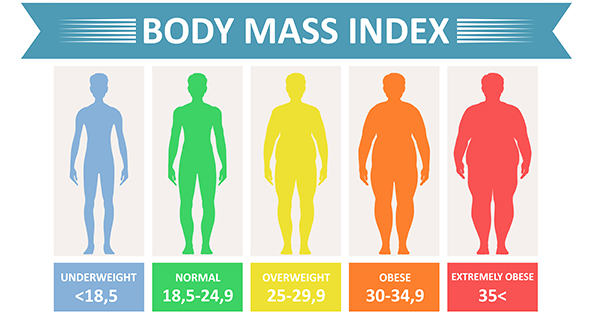Are There Any Medical Reasons Why I Can’t Lose Weight?
Houston Endocrine Center2022-09-19T14:46:21+00:00Weight loss is a topic that most people have dealt with at some point in their lives. Whether it’s intentional or unintentional, losing weight can be difficult. Getting to a healthy weight can be even more challenging if you’re experiencing medical reasons why it’s not happening immediately as you’d like.
So what are the possible medical reasons you may not lose weight? Are there any reasons other than diet and exercise? What do doctors recommend if this becomes an issue for you?

What Is Obesity?
Obesity is a body mass index (BMI) of 30 or higher. BMI is calculated by dividing your weight in kilograms by your height in meters squared, or (w/h2). A healthy BMI range for adults is between 18.5 and 24.9, with anything above 25 classified as overweight and 30+ as obese.
Obesity has been causing health problems such as heart disease and type 2 diabetes, so if you think that you can’t lose weight because of a medical condition related to these illnesses, then it’s important to speak with a doctor before jumping into any drastic lifestyle changes.

Index mass body. Rating chart of body fat based on height and weight in kilograms. Vector flat style cartoon illustration isolated on white background
Side Effects Of Obesity
Obesity can cause several health problems, including:
- High blood pressure
- Heart disease and stroke
- Type 2 diabetes
Obesity may be the reason for developing sleep apnea. This is a condition where you stop breathing for short periods during sleep. If you have sleep apnea, your brain doesn’t get enough oxygen, leading to serious health problems like heart attacks and strokes.
The main way to treat obesity-related conditions like these is with weight loss or bariatric surgery (sometimes called “stomach stapling”). Bariatric surgery is an operation that removes part of your stomach, so it’s smaller than normal size.
This reduces the amount of food that can fit inside the stomach and slows down how quickly food moves through it.
You might also need treatment for other medical conditions related to being overweight or obese—for example,
- Hypertension
- Type 2 diabetes
- Hyperlipidemia
- Obstructive sleep apnea syndrome (OSAS)
- Coronary heart disease
- Depression/anxiety disorders.
Why Am I Not Losing Weight?
If you are not losing weight, it could be due to several reasons. You may be eating too much and not exercising enough, or you could have a medical condition preventing you from losing weight. You might have:
- A thyroid problem (hypothyroidism)
- An underactive pituitary gland (hypopituitarism)
- Polycystic ovary syndrome (PCOS)

Possible Medical Reasons That Restrict Weight Loss
There are a few medical reasons you may be unable to lose weight.
- Polycystic Ovary Syndrome
- Hypothyroidism
- Insulin Resistance
- Hormonal changes
- Mental health issues
Polycystic Ovary Syndrome
Polycystic ovary syndrome (PCOS) is a condition that involves irregular periods, facial hair, and acne. It may also lead to weight gain, which makes it difficult to lose weight.
What Is PCOS?
PCOS occurs when the body produces high levels of certain hormones, including androgens. Androgens are male sex hormones that women also have in smaller amounts. In PCOS, these hormones cause an imbalance in your body’s reproductive system, leading to infertility (the inability to get pregnant).
Symptoms Of PCOS
- Irregular periods or complete lack of menstruation (amenorrhea)
- Hair growth on your face, chest, and abdomen — not just your scalp — called hirsutism, as well as unwanted facial hair growth known as virilization
- Acne
Hypothyroidism
Hypothyroidism, also known as underactive thyroid, is the most common cause of weight gain. The thyroid gland secretes hormones that control energy levels, heart rate, and blood pressure. If you have hypothyroidism, your body doesn’t produce enough of these hormones.
In men and women older than 50 or those who are overweight or obese when they develop this condition, underactive thyroid can be caused by dietary factors such as too much salt or not enough iodine in the diet (the body needs iodine to make the thyroid hormone).
Some medications may also contribute to an underactive thyroid.
Insulin Resistance
Insulin is a hormone that helps use glucose (blood sugar) for energy. Insulin resistance is when the body does not respond to insulin properly. If you have insulin resistance, you may need higher insulin doses or more frequent injections to control your blood sugar levels.
Insulin resistance can lead to type 2 diabetes and high blood pressure, increasing your risk of heart disease and stroke.
Obesity is one cause of insulin resistance; lack of exercise can lead to this condition. A person’s age may contribute as well: As they age, muscles become less sensitive to the effects of insulin and cannot respond appropriately as needed by the body, causing an increase in blood sugar levels over time.
Hormonal Changes
Hormones can also play a role in weight gain. If you’ve recently had an abnormal hormone level, you may be experiencing a slow metabolism or difficulty losing weight. This could be because of a thyroid problem or even the early stages of pregnancy.
If your hormones are out of whack—and they’re not just making you moody—then it’s worth seeing a doctor rule out other medical conditions that could be causing your symptoms.
In some cases, hormonal changes can be caused by other health problems like diabetes, hypothyroidism, and polycystic ovary syndrome (PCOS).
In addition to checking with your doctor about any hormonal changes, there are steps you can take to help mitigate them:
Keep track of what foods cause cravings for certain carbohydrates, such as loaves of bread and pasta; these may contain more sugar than necessary for what we need based on our daily caloric intake goals, so keep track!
Eat healthy meals throughout the day so that you never have an extreme hunger pang leading to overeating later in the evening.
Mental Health Conditions
If you have a mental health condition, this may be affecting your ability to lose weight.
Mental illnesses like depression and anxiety can lead to changes in appetite and activity levels, which may affect weight loss efforts. If you’re suffering from one of these conditions and are struggling with your weight, talk to your doctor about what they suggest doing differently and how they might help you manage any symptoms of the illness that changes in diet could cause.
Suppose you have schizophrenia or bipolar disorder (manic depression). In that case, it’s important to maintain regular meals and exercise routines because these regulate blood sugar levels which help prevent mood swings that could cause an increase in food cravings.
These two conditions also put people at risk for diabetes, so keeping an eye on the diet will help avoid complications later on down the road—and keep blood sugar levels stable!
Other Reasons
- Sleep apnea
- Thyroid problems
- Mental health problems
- Chronic stress and anxiety
- Cushing syndrome
Chronic Stress
-
Stress
Many studies show that stress can cause you to overeat and avoid exercise, resulting in weight gain.
-
Tiredness
If you’re always tired, it’s hard to get motivated to exercise (especially when you’re exhausted).
-
Irritability
Feeling irritable makes it difficult for you to stick with a diet plan because being around others stresses you out and might make it hard for them not to react negatively when they see how much food is on your plate at mealtime—not exactly a supportive environment.
Cushing Syndrome
Cushing syndrome occurs when the body produces the hormone cortisol in excess. The common cause of Cushing syndrome is taking too much corticosteroid medication, which can be prescribed to treat inflammatory conditions.
Hashimoto’s Disease
Hashimoto’s disease is an autoimmune disorder in which your immune system attacks the thyroid gland. It causes hypothyroidism, a condition where your body doesn’t produce enough of certain hormones.
Symptoms Often Include
- fatigue
- weight gain
- muscle aches
- joint pain
- depression.
It’s possible that Hashimoto’s disease could contribute to your weight gain — but it’s important to get a proper diagnosis before making any assumptions about the cause of your weight struggles.
Congestive Heart Failure
Congestive heart failure is when the heart cannot pump enough blood to meet the body’s needs. Symptoms include shortness of breath, fatigue, and swelling in the legs and abdomen.
See a doctor immediately if you have these symptoms while trying to lose weight. This is a fatal condition that can be life-threatening if not treated properly.
Insomnia
Insomnia is a common problem caused by several factors, including stress, depression, anxiety, or hormone imbalances. Lack of sleep over time leads to an increased stress response from your body. This can cause an increase in cortisol levels, suppressing appetite and increasing fat storage in the body.
Another reason for difficulty sleeping could be related to food sensitivities. Foods like gluten, dairy, and sugar have been shown to cause digestive problems such as bloating, leading to chronic pain and poor sleep quality.
If you think you might have any underlying medical conditions causing insomnia,I recommend seeing your doctor for further assessment before making any changes to your diet or exercise routine!
Conclusion
If you’re having trouble losing weight and think you might have a medical reason for it, consult your doctor. It’s good to be aware of any health issues or conditions affecting your weight loss goals to address them early on.
And remember:
If you have diabetes or high blood pressure, there are ways to manage those conditions so they don’t hold back your progress towards a healthier lifestyle!

